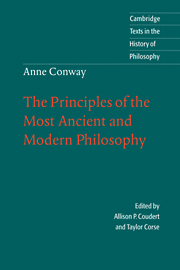Book contents
- Frontmatter
- Contents
- Acknowledgments
- Introduction
- Chronology
- Further reading
- Note on the text
- The Principles of the Most Ancient and Modern Philosophy
- Unpublished Preface by Henry More
- Published Preface
- Chapter I
- Chapter II
- Chapter III
- Chapter IV
- Chapter V
- Chapter VI
- Chapter VII
- Chapter VIII
- Chapter IX
- Index
- Cambridge Texts in the History of Philosophy
Chapter III
Published online by Cambridge University Press: 18 November 2009
- Frontmatter
- Contents
- Acknowledgments
- Introduction
- Chronology
- Further reading
- Note on the text
- The Principles of the Most Ancient and Modern Philosophy
- Unpublished Preface by Henry More
- Published Preface
- Chapter I
- Chapter II
- Chapter III
- Chapter IV
- Chapter V
- Chapter VI
- Chapter VII
- Chapter VIII
- Chapter IX
- Index
- Cambridge Texts in the History of Philosophy
Summary
S. 1. God is a most free agent and yet most necessary. S. 2. The indifference of the will, which the Scholastics believe is in God, is pure fiction. S. 3. God created the world not because of some external necessity but from the inner impulse of his divine goodness and wisdom. S. 4. There are infinite creatures and infinite created worlds. S. 5. The smallest creature of which we can conceive has infinite creatures in itself S. 6. This, however, does not make them equal to God. S. 7. A refutation of imaginary spaces which were invented by the Scholastics as if they existed apart from creatures. S. 8. Successive motion has no place in God. S. 9. An answer to the objection. S. 10. All creatures are united in a certain way.
S. 1. Moreover, if the aforementioned attributes of God are duly considered, and especially these two, namely his wisdom and goodness, then it is possible utterly to refute and eliminate that indifference of the will which the Scholastics and those falsely called Philosophers believe to be in God and which they incorrectly call free will. For although the will of God is most free so that whatever he does in regard to his creatures is done without any external force or compulsion or without any cause coming from the creatures (since he is free and acts spontaneously in whatever he does), nevertheless, that indifference of acting or not acting can in no way be said to be in God, for this would be an imperfection and would make God like his corruptible creatures.
- Type
- Chapter
- Information
- Publisher: Cambridge University PressPrint publication year: 1996

